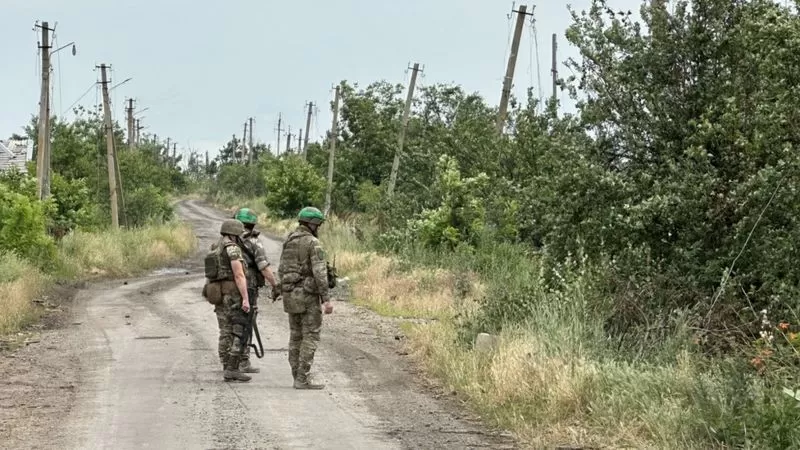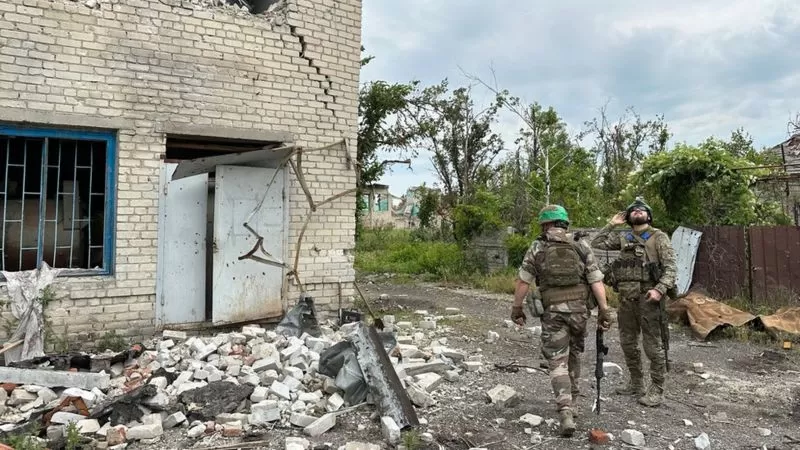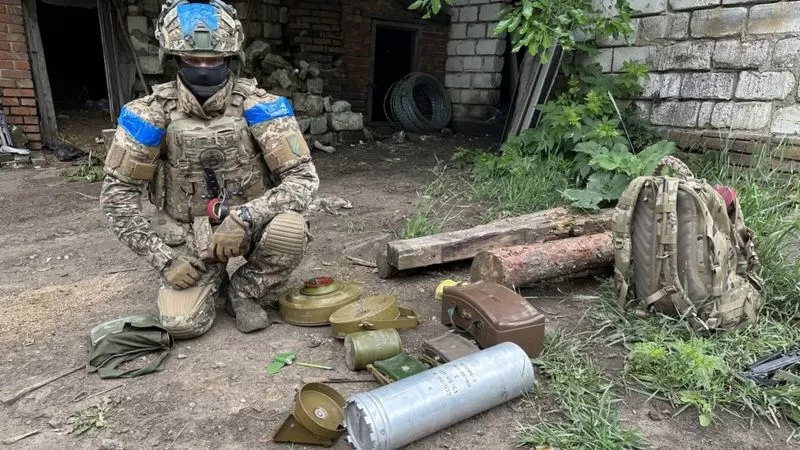(BBC) A Ukrainian soldier crawls across the grass with a bruised leg. Seconds later, a bright orange flash and a cloud of white smoke mark the spot, a few meters away, where another landmine detonates.
A second severely wounded soldier climbs into an armored vehicle waving his arms and leaving a thick smear of blood. All this was recorded live last week by a Ukrainian army drone flying over the front line south of the town of Bakhmut in Donbas. Seen from above, the minefield of craters looked like an irregular series of dark brown circles.
“Mines are scary. They scare me more than anything else,” said Artyom, a 36-year-old soldier in Ukraine’s 108th Territorial Defense Brigade. Two days earlier, two of his colleagues had stepped on “petals” – small green mines recently scattered by Russian rockets.
“Our men were experienced, but it’s hard to look at all sides. Each of them had a leg amputated. We got landmine injuries after every fight,” says Artyom, one of the soldiers tasked with digging trenches during the conflict. Artyom explains that Russian forces laid new mines, by means of rocket fire, in places that had already been cleared by Ukrainian forces.
Mines to slow the advance of troops
Ukraine’s long-awaited counteroffensive has not yet achieved the speed and momentum expected by some, including President Volodymyr Zelensky, who admitted that the counterattack is being “slower than desired.”
Several soldiers we spoke with in different sections of the front line attribute this, in part, to Russian minefields.
“Sure, it slows down troop movement,” says Dill, the commander of a nine-man squadron.
He has just completed a mine clearing mission on the eastern front of the small, ruined village of Predtechyne on the outskirts of Bakhmut. He places several deactivated Russian mines on the ground under a tree after ensuring that Russian drones will not detect them.
“The enemy has no mercy on his own soldiers. They are used as a cannon fodder. But we are trying to advance with minimal casualties,” stated Lieutenant Serhii Tyshenko of the 3rd Assault Brigade from a nearby bunker.

‘I hate this job’
About a three-hour drive south, several Ukrainian soldiers are crouched beside a bumpy highway. They carefully disarm a powerful Claymore antipersonnel mine hidden near a power pole.
“I hate this job,” confesses Artyom, a former auto mechanic, moments after disarming the mine. There is a hiss, then a bang, as a Russian artillery shell hits the nearby fields.
Along a hillside, Ukrainian infantry slowly advance south past the newly captured town of Rivnopil.
Artyom’s anger is not just about the dangers of the minefields, but about what it means to lay mines and booby traps instead of fighting the enemy “man to man.”
Later, at their temporary base in a hut several miles away, the soldiers express frustration at the lack of mine clearance equipment and soldiers to remove mines-four of whom have been injured in recent weeks.
But then Artyom shows us a large antenna and takes out a laptop to start playing back recent recordings of alleged radio intercepts by Russian soldiers.
The messages full of swear words seemed to indicate a degree of chaos and low morale.
“Our kamikaze drone hit our own vehicle. We have one dead and one wounded.”
“Soldiers are fleeing. Some are stealing cars. Fifty people have fled.”
The radio intercept suggests that Russian soldiers were abandoning their positions after a Ukrainian artillery bombardment.
“That happens from time to time. In groups of 10 or 20 people they disappear and leave without permission. The Russians know that we can listen in on their communications, but sometimes they forget,” Artyom says.

Optimism about the advance
He calls himself “realistic” about the Ukrainian counteroffensive. He claims that many people “in the media and society are in a hurry” and expect rapid progress. Two Ukrainian fighters fly low with a deafening roar, followed by a succession of collisions in front further south. Soon after we hear artillery and what sounds like a long-range HIMARS rocket system hitting Russian positions.
Ukraine’s counteroffensive may be slow and relatively quiet at this stage.
But one military man, speaking on condition of not being identified, suggests that this patient approach will soon pay off, as long-range strikes have destroyed Russia’s ability to rearm its frontline units and lowered morale among Putin’s troops, making room for strategic advances by Ukrainian forces.
“You will see that soon enough,” he says.
As for the vast minefields still awaiting the Ukrainian counterattack, Dill, the squadron commander near Bakhmut, is calm and confident.
“We are learning to improvise and invent ways to open fast and safe paths through the minefields. But we are fighting a very fierce enemy,” he acknowledges.
